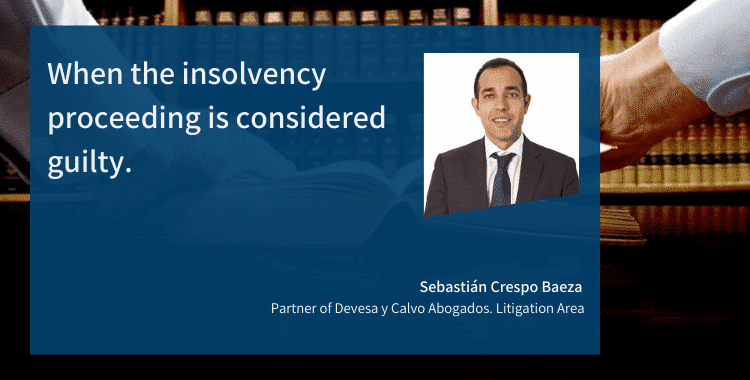
When the insolvency proceeding is considered guilty.
Article 163 of the Bankruptcy Law states that the bankruptcy must be declared either fortuitous or guilty. Although the Law does not define fortuitous bankruptcy, Article 164 exhaustively regulates the so-called guilty bankruptcy, considering that its declaration applies if, within the two years prior to the date of declaration of the bankruptcy, there was fraud or fault at the generation or aggravation of the insolvency, on the part of the debtor, its legal representatives and, in the case of a legal entity, its administrators, liquidators, or general representatives, in fact or in law.
The following are various cases that require the declaration of the insolvency proceedings as guilty: double counting or the lack thereof, the provision of false documents to the application for the declaration of insolvency proceedings, or the serious inaccuracy of the documentation submitted; failure to comply with the agreement that leads to the liquidation procedure; assets stripping or the frustration of the seizure by means of manoeuvres aiming to delay or prevent the execution, the fraudulent exit of assets or rights from the debtor’s estate done in the two previous years, or the simulation of fictitious assets.
In addition, the Bankruptcy Law regulates various presumptions of guilt. That is to say, situations that allow for the presumption that the bankruptcy is guilty, although it will not necessarily be found guilty since there can be evidence to the contrary, proving that the insolvency has not been caused by the fraud or serious fault of the bankrupt party.
In this sense, and among others, the bankruptcy is presumed to be guilty when the duty to apply for the bankruptcy has not been fulfilled; when there has been a lack of collaboration with the judge or the bankruptcy administration; in cases of failure in the preparation or deposit the annual accounts; and in case of lack of submission of the annual accounts to an audit, by the companies obliged to do so.
The main consequences of the having a judicial sentence classifying the bankruptcy as guilty are the disqualification of the persons affected by the declaration of guiltiness, which will be disable to manage and administrate assets of others for a period of two to fifteen years, and the loss of any right they may have had as bankruptcy creditors (holders of “créditos concursales”) or estate creditors (holders of “créditos sobre la masa”), as well as the obligation to return the assets or rights they may have improperly obtained from the debtor’s estate or received from the insolvency proceeding estate, and to compensate for the damages caused.
Finally, when the calcification section has been formed -or reopened, as a result of the opening of the liquidation phase-, the judge may sentence all or some of the administrators, liquidators, in fact or in law, or general attorneys-in-fact of the bankrupt legal entity, as well as its shareholders in some cases, to cover, in whole or in part, the deficit of the proceeding, to the extent in which the conduct determining the guilty declaration has generated or aggravated the insolvency.
Partner and lawyer in charge of the Litigation area at Devesa & Calvo Abogados
